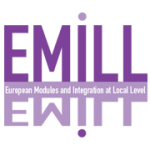EMILL – European Modules and Integration at Local Level
-
DESCRIPTION
EMILL stands for European Modules and Integration at Local Level. More than a rhetorical wording, the acronym heeds the challenge of integrating third country nationals into receiving societies and acknowledges that this challenge is geographically situated. That is, there are as many integration challenges as there are places, cities, regions, countries and so forth. Because the context changes drastically from one place to another, even within the frontiers of a same country, integration can scarcely be imagined at macro level and, rather, needs to be thought locally.
In this manner, EMILL brings different organisations at different levels and from different countries around the same table for the elaboration of a common methodology enabling the benchmarking of practices and their analysis as they take place within local contexts. To reach its objective, EMILL departs from the Draft European Modules on Migrant Integration (European Commission, DG HOME, July 2011; available on this page in the e-Library) and draws therein relevant elements of comparison considering notably Module 1 on language and introductory courses and Module 2 Component 2 on access to services.
The tool thereby developed and tested shall prove applicable to diverse environments, notably to cities as they concentrate a great share of the migrant population and as they shelter a wide range of initiatives for the integration of third country nationals. In this fashion, the project is in line with other initiatives promoting exchange and enhancement of practices implementation and political context but goes beyond the provision of examples.
To be more specific, EMILL has not been thought as a one-off try to benchmark integration practices but rather as a step towards a more comprehensive instrument to be applied at relevant levels. Such an instrument, in its further developments, will enable the identification of hindrances related to contextual indicators and present them in perspective with other European cases. Therefrom, one will be able to enhance the implementation of practices by inspiring context changes from other’s experience.
 English
English Italiano
Italiano





